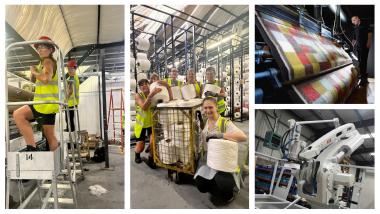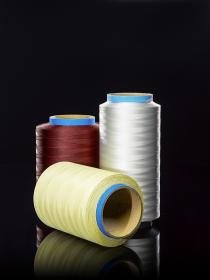Sellers Textiles Engineers: New Shearing line for Phoenox
As part of an ongoing investment programme ensuring it remains at the forefront of advanced technology for carpet production, West Yorkshire, UK-headquartered Phoenox Textiles has recently installed a new two-metre-wide shearing line supplied by BTMA member Sellers Textiles Engineers.
Phoenox, which has been family owned since its foundation in 1954, develops original creative flooring design concepts for retail brands. Its products are sold through high street outlets, department stores and volume retailers across Europe and North America, in addition to substantial online and catalogue-driven business. All told, the company’s 24-hour parcel service dispatches some 3.2 million orders every year.
Operating from two manufacturing sites, Phoenox manufactures an annual 1.7 million metres of flooring in the UK. Over a combined area of 1,700,000 square metres, the two plants are equipped for tufting, backcoating, cloth printing and finishing along with automated cutting, sewing and packing.
In addition to the Sellers shearing line, other recent investments for the UK operations have included three new advanced tufting machines and a high-speed Sellers backcoating line equipped to handle widths of up to two metres and coat at six metres per minute. Washable and dyeable foams and eco-friendly applications in different weights are applied for many product areas.
The company’s state-of-the-art Chromo jet printing process line is meanwhile the only one of its kind in the UK, with its 256 jets making possible designs in up eight colours per pattern. With sustainability very much at the forefront of the company’s approach, Phoenox recycles most of its paste and inks and uses organic options wherever possible, as well as recycled water.
“We operate a piece dye colour cloth programme and can dye nylon and cotton with weights of up to 500kg per load, working with direct, organic, vat and reactive dyes,” says Mosley. “We also offer computerised and weighed commission dyeing. Computerised automated cutting machines and photocell pattern recognition enable us to cut at high speed in most cloth densities. With finishing and sewing though, it’s all about the detail, and our team have years of experience and hand-finish our products on traditional high-speed machines.”
The new Sellers Hybrid Shearing Cylinder can provide a competitive edge for manufacturers which is currently being proven in the field, including at Phoenox. It’s one of a number of new innovations BTMA members are planning to showcase at next year’s ITMA exhibition in Milan.
AWOL for Phoenox Textiles












